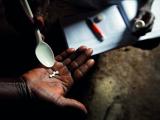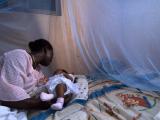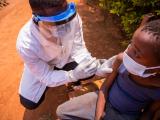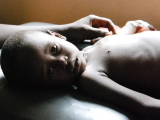Aug 10, 2011
E coli cases in Michigan lead to ground beef recall
Michigan officials today announced five confirmed and four suspected cases of Escherichia coli O157:H7, one day after the US Department of Agriculture (USDA) notified the public of a ground beef recall in the state because of the oubreak. The Michigan Department of Community Health (MDCH) said in a news release that the nine case-patients, ranging in age from 15 to 88, were from Lapeer, Genesee, Isabella, and Sanilac counties and ate ground beef produced by McNees Meats and Wholesale LLC., of North Branch, Mich. Illness-onset dates range from Jul 18 to Jul 30, and six of the patients required hospitalization. Because of the E coli illnesses, the USDA's Food Safety and Inspection Service (FSIS) yesterday announced a recall of 360 pounds of McNees ground beef sold in 10-pound bags to restaurants in Armada, Lapeer, and North Branch. The products were also sold from a McNees-owned retail store. The FSIS said in a release yesterday, when three outbreak cases had been confirmed, "As a result of the epidemiologic investigation, FSIS determined there is a link between the ground beef products and the illnesses in Michigan. FSIS is continuing to work with the Michigan state public health partners on the investigation." Authorities are advising those who bought the meat to throw it out.
Aug 10 MDCH press release
Aug 9 FSIS news release
Study: US military personnel born in West Africa have high malaria rates
US military personnel who were born in West African countries have vastly higher rates of malaria than personnel born in the United States, according to a report published today by Emerging Infectious Diseases (EID). Researchers looked at military disease surveillance data and found that 835 malaria cases were reported among active service members from 2002 through 2010. About 75% of the patients were born in the United States, and 12.8% were born in malaria-endemic countries other than Mexico. The highest malaria rates were found among soldiers who were born in Cote d'Ivoire, Togo, Cameroon, and Ghana. Of 15 birth countries that accounted for most of the cases, the seven associated with the highest rates were in West Africa. The malaria rate was 44 times higher for personnel born in those countries than for those born in the United States. The researchers concluded that most of these personnel contracted the disease while visiting their native countries. Residents in malaria-endemic countries develop partial immunity to the disease because of repeated exposures, but this immunity wanes if they immigrate, rendering them susceptible during subsequent visits, the authors write. Because of this, US immigrants from malaria-endemic countries should receive pre-travel counseling and get preventive treatment before, during, and after such visits, they advise.
Aug 10 EID report
Polio cases rise in Pakistan in 2011
Pakistan continues to see an increase in polio cases, with 63 cases confirmed this year compared with 36 over the same period in 2010, according a BBC News report yesterday. Balochistan province has had the most cases, 22, according to data from the United Nations Children's Fund (UNICEF). The agency said the virus circulated in five high-risk districts in Balochistan and has now spread to areas not affected in the past 5 years, including the country's tribal areas and the provinces of Sindh and Khyber Pakhtunkhwa. The next polio vaccination campaign will be held Sep 19 through 21 and seek to immunize 16.5 million children in the highest-risk districts in the country. "This massive undertaking can succeed, but only with the tireless efforts and commitment of the people of Pakistan," UNICEF said in a statement.
Aug 9 BBC story
UK reports increase in post-polio syndrome
Post-polio syndrome—a relapse of the disease after the virus has lain dormant for years in a polio survivor—is on the upswing in the United Kingdom, according to a Daily Mail story yesterday. Although first described in the 1980s, the problem is increasing in UK survivors as they live long enough to experience it. The syndrome is believed to affect at least 8 of 10 polio survivors, according to the article. Experts aren't sure whether the resurgence is caused by a sudden reactivation of the virus or by abnormal regrowth of damaged nerves. "It is a disaster for many of these people—a tragedy," said Carolyn Young, a professor of neurology at The Walton Centre in Liverpool, who is leading the first research project on post-polio syndrome, involving more than 200 people age 50 and over. Researchers are exploring which treatment might most effectively alleviate symptoms.
Aug 9 Daily Mail story
















